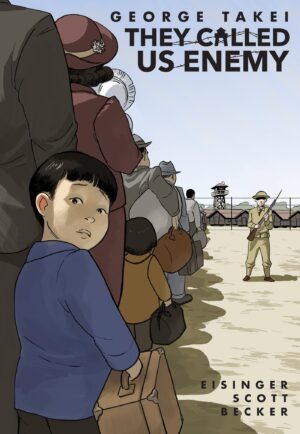Generational Split
by Kaylee Jaime
As someone who grew up first generation, similar to George Takei, I share a lot of the same experiences he did. Despite spending a portion of his life in an internment camp, Takei captured the “beauty” amongst all of the ugly that was going on. He showed us the viewpoint of this situation from a child, too young to see the real situation going on, and how parents will do everything in their power to shield their children from the real world. Current situations in Los Angeles relate to this book I find. While my experiences are nowhere near as strong as Takei’s, he touches on the subject of generational gaps and feeling like you don’t belong on one side or the other.

I was hoping not to start off on such a sour note, but one quote I pulled from George Takei’s They Called Us Enemy (2019) on page 79 that says, “At thirty-nine years of age, daddy bridged the gap between the community elders, and the younger American born nisei”, really reminded me of the current situation going on in city hall right now, (as of 10/18/22). Many of the younger generations are coming together with the older generations in protest of what those four Los Angeles City Council members said. As a Mexican American, it really pains me to hear what was said, because we shouldn’t be dividing ourselves, and certainly not dividing ourselves from our own people. It really breaks the “trust” within the community.
The older generations, such as our parents, sacrifice so much for their children. Takei mentions his mother’s experience through his eyes on page 116, and it reads, “Now she was expected to put family second to a nation that had rejected them.” Even in recent times, many families are expected to do this. I see this present in field workers, waking up at early hours of the morning to put food on our table, only to be met with people telling them to go back to their country and doing everything in their power to kick them out. Despite these efforts, they all continue to labor to put food on their family’s table, and sometimes they do not even get to see their children grow up because they are working all day.
This brings me back to a point I made in the second paragraph about current events, many of these workers come to a foreign country to improve their situations and provide their family with the luxuries they did not have growing up. When a certain group of people talk about kicking them back to their place of origin, it reminds me of the situation Takei’s mother faced in the quote I mentioned. Even though this nation rejects them and wants to get rid of them, they still bust their butts off for us.
This topic also brings me to another good quote related to this. On page 121, Takei recalls President Clinton saying, “Rarely has a nation been so well-served by a people it has so ill- treated.” Field workers and minorities are a perfect example. Those four LA City Council members and their racist comments plus this quote really resonated with me, as those same people they were talking bad about, were the ones that put them in those positions of power. I keep coming back to this topic, but it really saddens me to be seeing this in 2022. The fact that the quote from a speech given twenty-two years ago can be applied today is sad as well. While those immediate to me, like my parents, were not farm workers, I have family who left their wife and children for extended periods of time to work here in the fields and give them a better life.
What I have noticed as a result of these people working these jobs is their children, around teens, being embarrassed by their parents. Whether it be because of the job or a fear that it could put their parents in a dangerous situation, many of them try to hide their heritage. Amy Uyematsu brings up a good point in her essay, saying, “Next they have rejected their physical heritages, resulting in extreme self-hatred.” It is sad that those like me may have to hide their heritage in fear of bullying, racism, or being left out and alienated. Unfortunately, I have seen many older generations that had to do this, as Uyematsu said, result in self-hatred as well as hatred towards their own people.
Both Takei and Uyematsu’s experiences resonate with me as a first- generation child. At some points I feel like I have struggled with my identity because I am either too Mexican for the Americans and too American for Mexican people, so I am just floating along. Despite this, I personally wouldn’t try to erase my heritage as my people are hardworking people. Many of them work in the fields putting food on our tables, making many sacrifices such as leaving family in another country to better all of them. Despite comments trying to separate our people by certain higher ups, they failed as it only brought us closer together, young, and old.
***
(Featured image by Flick user Gage Skidmore; used under CC BY-SA 2.0)
